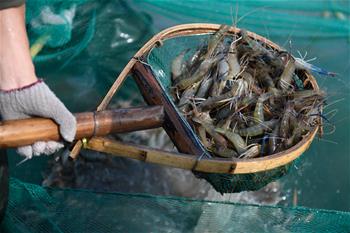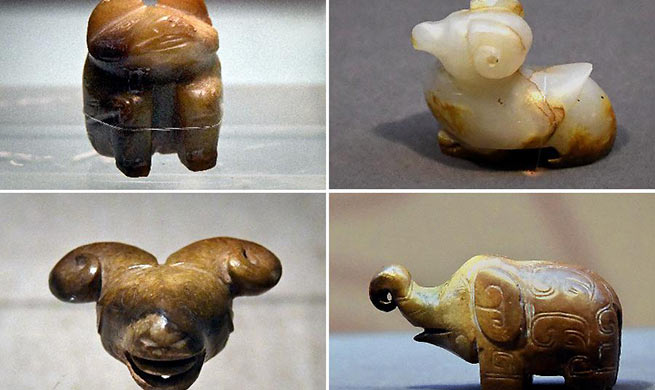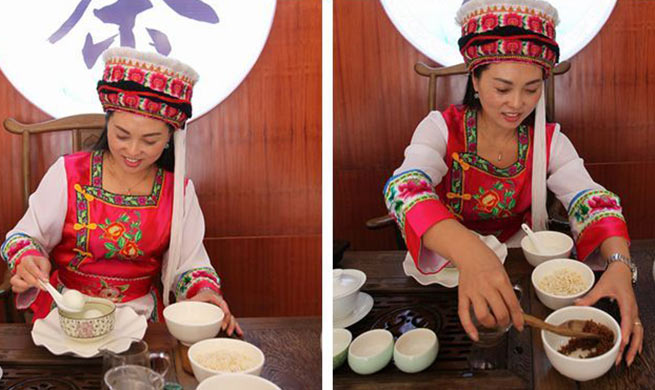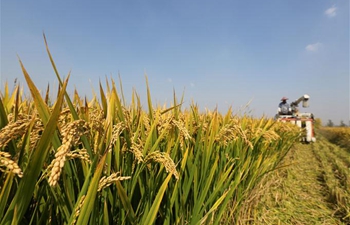DUSHANBE, Oct. 12 (Xinhua) -- Prime ministers of the member states of the Shanghai Cooperation Organization (SCO) on Thursday gathered here for their annual meeting to discuss the organization's development, with mutual understanding and traditional friendship strengthened.
Established in 2001 by China, the SCO has significant potential, especially after the accession of India and Pakistan as full members in 2017.
In a joint communique issued on the outcomes of the meeting, the SCO prime ministers agreed to deepen and expand cooperation as well as to explore significant potential in the fields of politics, security and trade.
They were committed to the further implementation of various SCO strategies including the agreements reached during the 18th SCO Summit held in June in eastern China's Qingdao.
The SCO countries also stressed the importance of people-to-people cooperation, which brings numerous benefits to the people of the SCO member states.
Considering the current international trade challenges such as the rising of unilateralism and protectionism, the member states agreed to promote the construction of new international relations based on mutual respect, equity and justice, and win-win cooperation, as well as the formation of a common vision of creating a community of a shared future for mankind.
The SCO countries supported the further improvement of global economic governance, agreeing to further deepen cooperation to jointly build an open world economy.
Six SCO countries including Kazakhstan, Kyrgyzstan, Russia, Tajikistan, Uzbekistan and Pakistan reaffirmed their support for China's Belt and Road Initiative, advocating the creation of a broad, open, mutually beneficial and equal partnership in the SCO space.
ECONOMIC COOPERATION
The prior direction for SCO development is to jointly create favorable conditions for the expansion of trade, economic and investment activities, according to the communique.
SCO countries should develop high-tech sectors of the economy and modernize various industries to improve their economic competitiveness and bridge the technological gaps between them, the document said.
It is important for SCO states to implement projects for infrastructure development covering transit and logistics, energy, agriculture, information and communication, among others.
To improve the livelihood of the SCO population, the organization agreed to facilitate the free movement of goods, capital, service and technology, to ensure multilateral trade and economic cooperation and further regional economic development.
To increase investment, innovation and employment, the leaders expressed their readiness to deepen exchanges and cooperation in e-commerce and trade in services.
The leaders stressed the importance of further deepening multilateral cooperation in transport and customs affairs through building transport networks, creating favorable road conditions, developing an integrated transport management system, which is unified and effective.
The SCO member states need to continue cooperation in the energy sector including using renewable and clean resources, shifting to an energy-efficient and sustainable economy, as well as building relevant infrastructures.
The leaders advocated further strengthening of practical cooperation in the financial sphere, including ensuring financial arrangements, applying national currencies in mutual settlements and supporting small and medium enterprises.
The SCO countries support active agricultural cooperation in such areas as processing and trade of agricultural products, scientific researches, joint projects implementation and food security.
PEOPLE-TO-PEOPLE COOPERATION
While laying out a roadmap for further promoting trade and economic cooperation within the SCO framework, the heads of government also called for expanding people-to-people cooperation.
They underlined the importance of further developing cooperation in a wide range of fields including culture, healthcare, education, science and technology, tourism, environment protection, mass media and sports.
In particular, the SCO countries confirmed the need to actively implement a series of agreements previously signed on cooperation in various humanistic areas.
They advocated further development of cultural ties by holding joint cultural events and strengthening mutual understanding between the SCO people, especially through platforms dedicated to communication between youths and women.
The leaders agreed that civil diplomatic mechanisms play an important role in strengthening mutual understanding as well as people-to-people and cultural exchanges among SCO member states.
They stressed the need to improve the legal basis of the SCO agreements and facilitate security cooperation in combating terrorism and extremism.
They emphasized the importance of strengthening cooperation to prevent and minimize the impact of disasters and emergencies, as well as to build emergency response capabilities to cope with outbreaks and spread of infectious diseases.
The SCO leaders approved the outcomes of ministerial meetings within the SCO framework in all fields and supported the development of interregional cooperation with the participation of regional heads of member states.
In addition, they reiterated their readiness to expand cooperation with the SCO observer states and dialogue partners, as well as the United Nations and other international and regional organizations, on an equal and mutually beneficial basis.

















